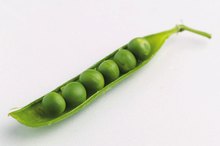What does fact checked mean?
At Healthfully, we strive to deliver objective content that is accurate and up-to-date. Our team periodically reviews articles in order to ensure content quality. The sources cited below consist of evidence from peer-reviewed journals, prominent medical organizations, academic associations, and government data.
- MayoClinic.com; Dietary Fiber: Essential for a Healthy Diet; 2009
- Harvard School of Public Health; Health Gains from Whole Grains; 2010
- "Journal of the American College of Nutrition"; Fiber from Whole Grains, but Not Refined Grains, Is Inversely Associated with All-Cause Mortality in Older Women: The Iowa Women's Health Study; D. R. Jacobs, et al.; Jun 2000
- "Journal of the American College of Nutrition"; Fiber from Whole Grains, but Not Refined Grains, Is Inversely Associated with All-Cause Mortality in Older Women: The Iowa Women's Health Study; D. R. Jacobs, et al.; Jun 2000
The information contained on this site is for informational purposes only, and should not be used as a substitute for the advice of a professional health care provider. Please check with the appropriate physician regarding health questions and concerns. Although we strive to deliver accurate and up-to-date information, no guarantee to that effect is made.
Dietary Fiber Vs. Soluble Fiber Vs. Insoluble Fiber
Fiber is an integral part of your diet, even though it is not a nutrient. Fiber is an indigestible substance, part of all plant-based foods, including fruits, vegetables, whole grains, legumes, nuts and seeds. Consuming a diet that includes plenty of whole plant-based foods enables you to fulfill your daily requirements of 38 g per day of fiber for men and 25 g per day for women. Consult your nutritionist if you have questions about fiber in your diet.
Dietary Fiber
Dietary fiber is the substance in plant-based foods that your stomach and intestinal enzymes do not digest. However; certain bacteria in your lower intestines may partly digest fiber.
Soluble Fiber
Advantages & Disadvantages of Natural Fibers
Learn More
Soluble fiber is indigestible substances in food that are soluble in water. Soluble fiber slows down the passage of food in the small intestines. Consuming foods high in soluble fiber may help you to reduce your blood cholesterol levels because the fiber reduces the amount of dietary cholesterol your body absorbs from food. Soluble fiber also slows down the absorption of sugar from foods into your blood, making it easier for you to control your blood sugar levels.
- Soluble fiber is indigestible substances in food that are soluble in water.
- Soluble fiber also slows down the absorption of sugar from foods into your blood, making it easier for you to control your blood sugar levels.
Insoluble Fiber
Insoluble fiber is substances in plant-based foods that are not soluble in water. These substances include lignin, cellulose and hemicellulose. Insoluble fibers increase the bulk of your stool and speed up the passage of waste through your digestive tract. Food sources of insoluble fiber include whole grains, such as wheat bran, beans and vegetables. Consuming foods with insoluble fibers helps you promote regular bowel movements and prevent constipation, hemorrhoids and diverticulosis.
- Insoluble fiber is substances in plant-based foods that are not soluble in water.
- Consuming foods with insoluble fibers helps you promote regular bowel movements and prevent constipation, hemorrhoids and diverticulosis.
Fiber From Whole Grains
How Much EPA & DHA Are in Chia Seeds?
Learn More
Consuming a high fiber diet that includes whole grains may reduce your risk of death. Whole grains contain the entire seed kernel, including the bran, germ and endosperm, higher concentrations of nutrients and more fiber content. Research by scientists at the University of Minnesota School of Public Health in Minneapolis and published in the "Journal of the American College of Nutrition" in 2000 reports that older women who consume whole grains have a lower death rate from all causes than women who consume refined grains 3.
Related Articles
References
- United States Department of Agriculture; Dietary Guidelines for Americans 2010; 2010
- MayoClinic.com; Dietary Fiber: Essential for a Healthy Diet; 2009
- "Journal of the American College of Nutrition"; Fiber from Whole Grains, but Not Refined Grains, Is Inversely Associated with All-Cause Mortality in Older Women: The Iowa Women's Health Study; D. R. Jacobs, et al.; Jun 2000
- Dahl WJ, Stewart ML. Position of the Academy of Nutrition and Dietetics: Health Implications of Dietary Fiber. J Acad Nutr Diet. 2015 Nov;115(11):1861-70. doi: 10.1016/j.jand.2015.09.003.
- Francesca De Filippis, et.al. High-level adherence to a Mediterranean diet beneficially impacts the gut microbiota and associated metabolome. Gut, 2015; gutjnl-2015-309957 DOI: 10.1136/gutjnl-2015-309957
- Harvard School of Public Health. http://www.hsph.harvard.edu/nutritionsource/carbohydrates/fiber/
- University of Maryland Medical Center. http://umm.edu/health/medical/altmed/supplement/fiber
- USDA.http://www.ers.usda.gov/topics/
Writer Bio
Jeffrey Traister is a writer and filmmaker. For more than 25 years, he has covered nutrition and medicine for health-care companies and publishers, also producing digital video for websites, DVDs and commercials. Trained in digital filmmaking at The New School, Traister also holds a Master of Science in human nutrition and medicine from the Columbia University College of Physicians and Surgeons.









